Penfolds Grange La Chapelle 2021: Eye-Wateringly Expensive but Thrilling Blended Wine
by Ken Gargett
An intriguing bottle of rum crossed my desk recently, Equiano. It is the first rum ever made from blending rum produced by a Caribbean distillery, Foursquare, with rum from an African producer, Gray’s Distillery in Mauritius. It was thoroughly enjoyable, although perhaps not the greatest rum ever made, but it seems to have been received positively by rum lovers.
This sort of thing is not uncommon among spirits producers. Four Pillars has made several gins by way of joint ventures with other gin distilleries around the world that have been greatly appreciated by gin lovers.
However, when we look at blending a wine from two continents, one could be forgiven for wondering if doing so means that all that awaits us now is the arrival of the Fourth Horseman. Cue the outrage-o-meter. The question should not be why wine and not spirits, but why a problem doing this with wine at all. We’ll get to that.
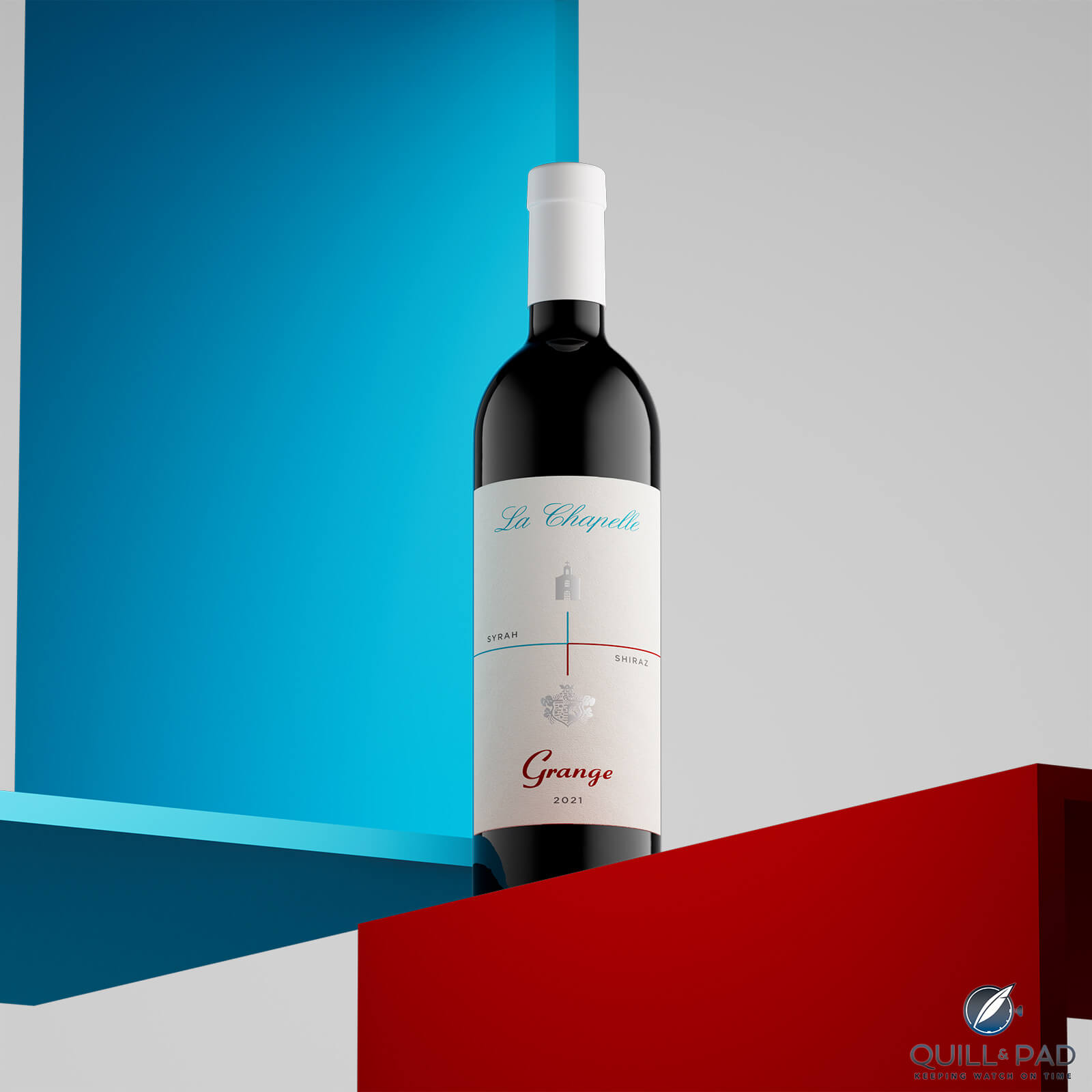
Penfolds Grange La Chapelle 2021
Penfolds Chief Winemaker, Peter Gago, well known for out-of-the-box thinking along with superb wines, put a proposal to a friend and fellow winemaker, Caroline Frey, whose family took over the legendary Rhone producer, Jaboulet, back in 2006. What about an intercontinental blend?
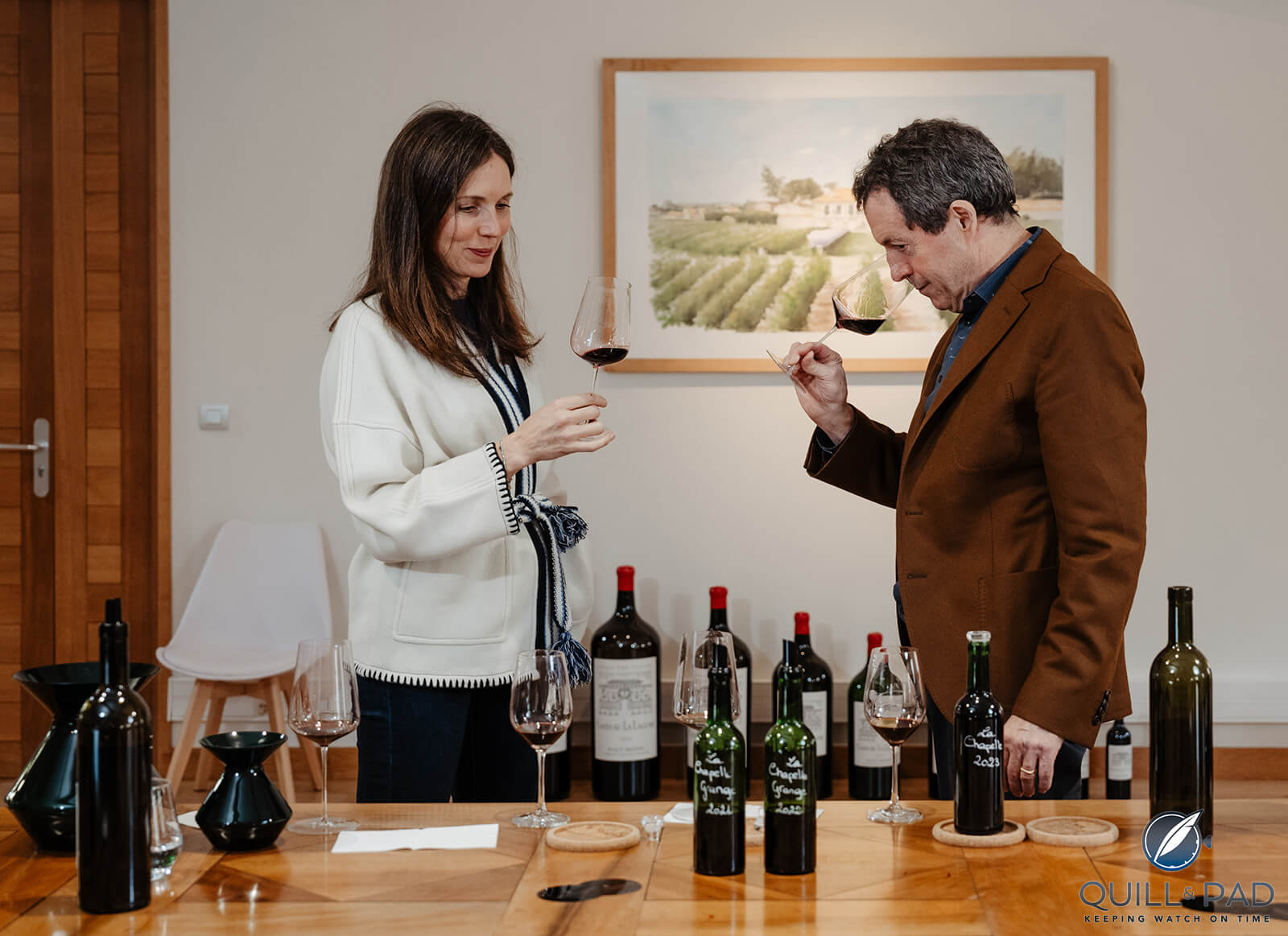
Caroline Frey and Peter Gago wine tasting session
Eventually, what was known in secret as Project Crochet, led to the release in Paris this February, of the Grange La Chapelle 2021.
No one had a clue it was coming. If there is one thing, aside from winemaking, which Penfolds is good at, it is keeping secrets. The US administration could learn a thing or two.
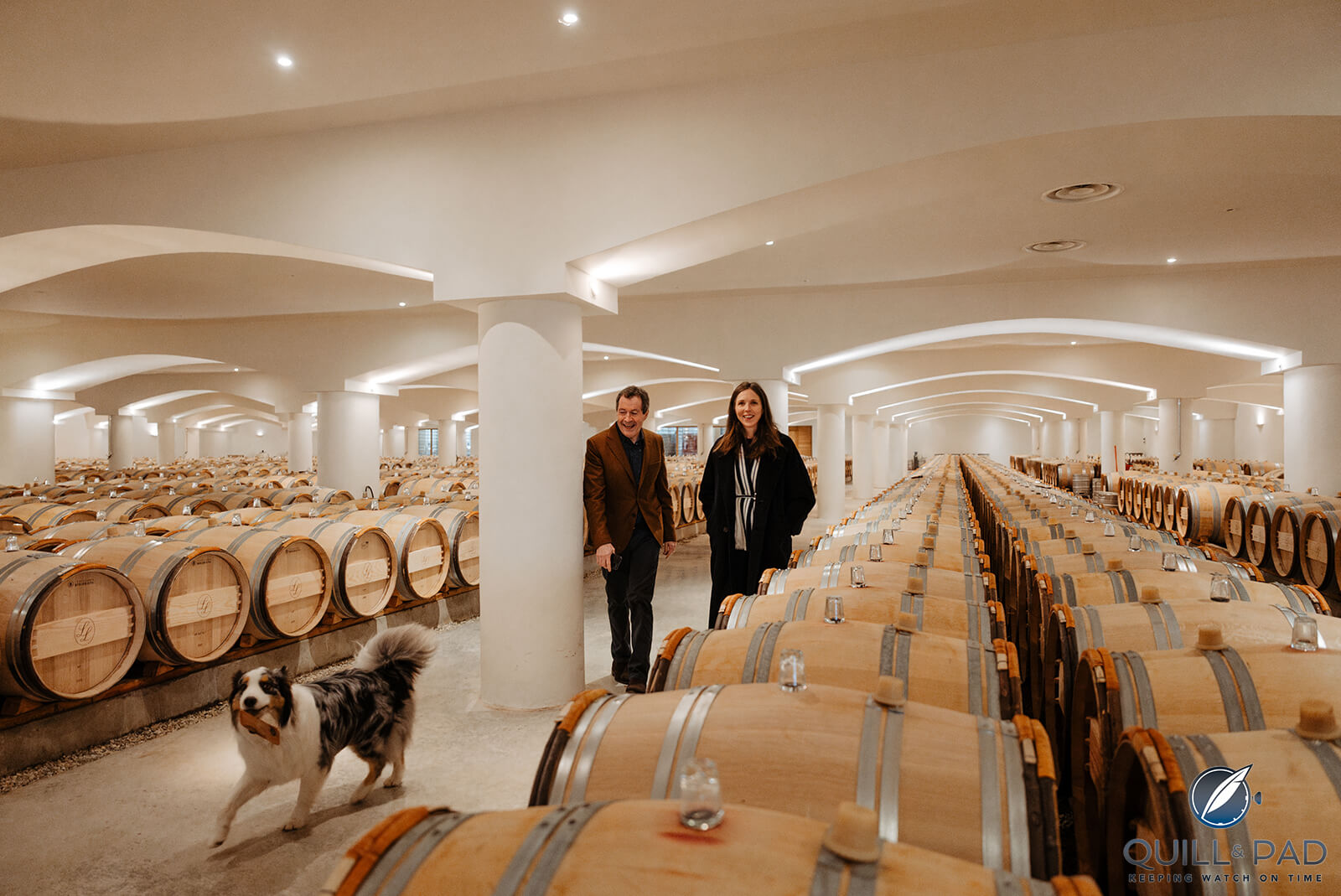
Caroline Frey and Peter Gago in the Rhone valley wine cellar
Peter has described Caroline’s response to his suggestion as being prepared to see where it went. There was a time when blending a great French wine with something that was, to put it politely, not French, would have seen winemakers racing for the barricades. No longer.
I have not mentioned this to Peter, but he is a couple of decades behind with this. I recall a dinner many years ago with friends. I had opened a bottle of Rousseau Clos St Jacques for the occasion (my last – well, in truth, my only bottle of this brilliant wine) and it was drinking exquisitely.
I needed to duck off briefly to use the facilities and when I returned, I noticed my friends had kindly topped up my glass. I thanked them but expressed surprise as I thought we had finished the Rousseau.
There was a moment of thundering silence as my friends looked at each other. It seems that they thought I had also knocked off my glass of Rousseau and that I was already on to the vintage port. It was with the vintage port that they kindly filled my glass, creating an early international blend. To be fair, it was not the worst thing I have ever drunk, but it really did not improve either wine. Does this new collaboration do better?
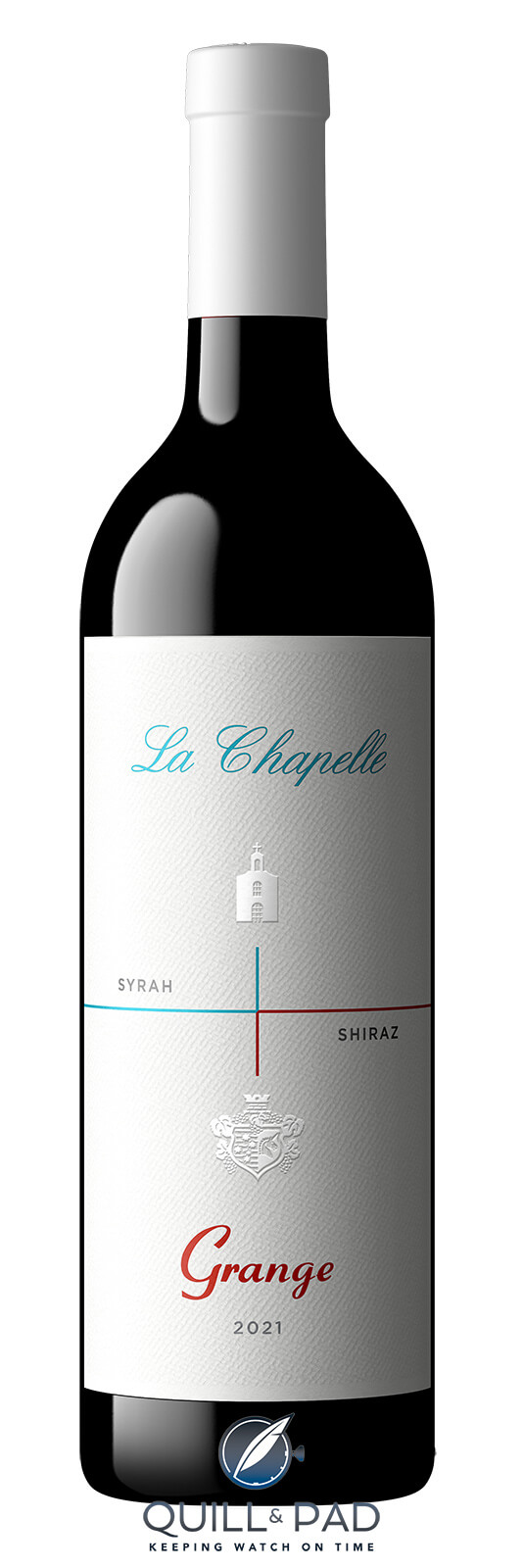
Penfolds Grange La Chapelle 2021
At A$3,500/€2,600, this blend is hardly for everyone, but the quantities are so limited that sourcing a bottle is likely to be more difficult than paying for it. That said, there was no trouble with the consumer response. The wine quickly sold out.
The story of how we got here could literally fill a book. A very large book. The history of both Grange and of La Chapelle has been told often and in detail. We will not rehash it all again, but suffice to say that it was not a simple matter of saying, how about we dump bottles of each in a vat, give them a stir and then rebottle, adding a monstrous price tag and making them ever-so-exclusive.
For legal reasons, crafting a wine like this cannot be done in France, so the La Chapelle component was air-freighted across to Australia. It went into barrels, mostly already used but 20% were new.
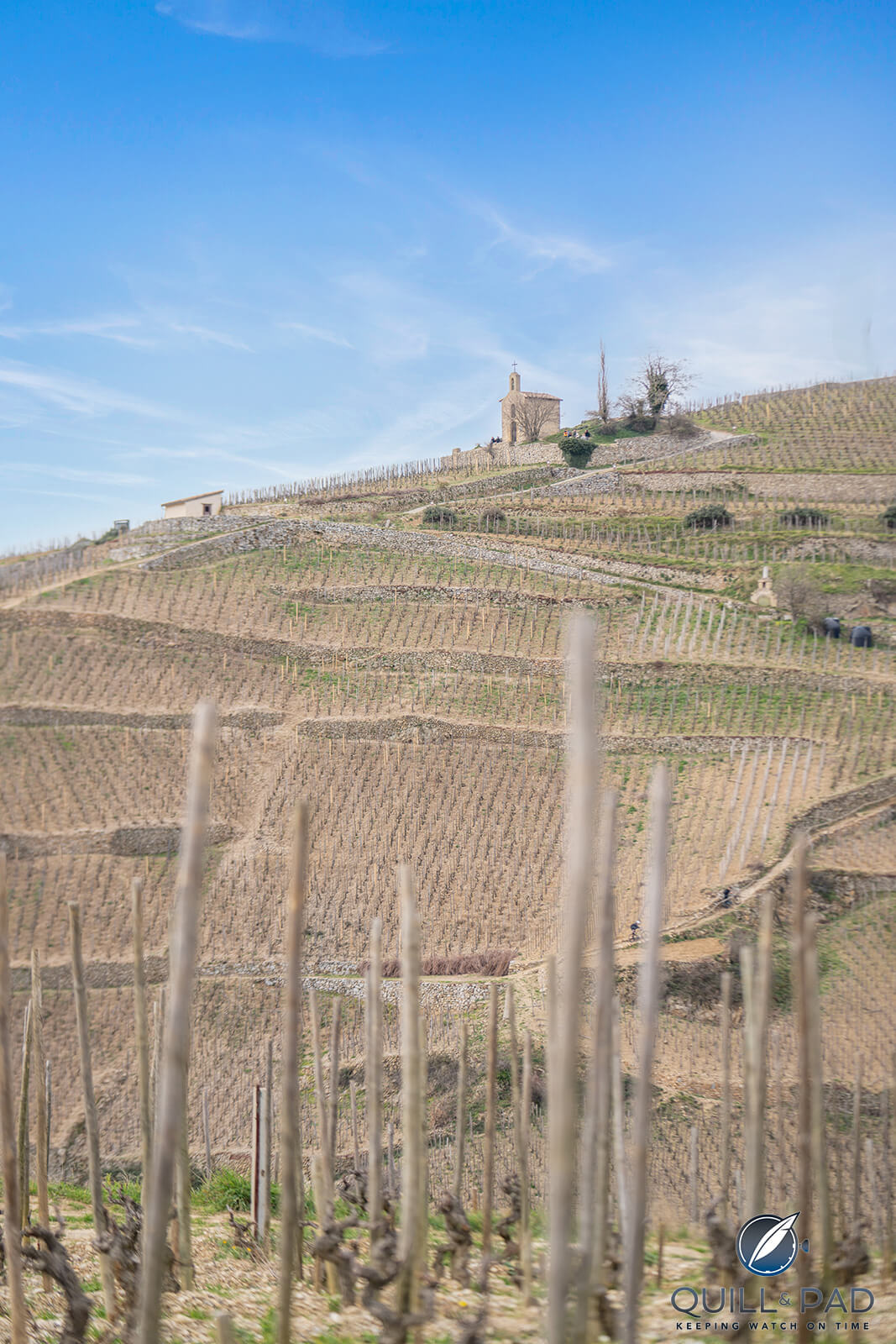
Penfolds The Hill of Hermitage vineyards
Both teams did extensive tastings and experimentation. There was no guarantee that the blend would come from their very best wines. Peter had thought, not unreasonably given that it sees very large, old oak, St Henri might be the go. As it turned out, the tastings confirmed not only that it was La Chapelle and Grange which married perfectly, it was a 50/50 split which was the sweet spot.
The decision was made that in future, this is the formula – an even contribution from these two great wines. It will only be offered when conditions in both regions provide grapes worthy of the project. After 2021, there is great excitement as 2022 is a fabulous vintage for both the Rhone and South Australia. 2023 and 2024 are also in the process.
The wine? If I may plagiarise my own notes, this is still inky dark in hue at this early stage. The wine has amazing intensity, with knife-edge balance, and a fine line of acidity.
Poised, taut and promising much more to come in future decades, it is marvellously approachable already.
There are notes of blackberries, tobacco leaves, plums, black cherries, leather, crushed herbs, florals, dark chocolate, cloves, cocoa powder, florals and coffee grinds woven throughout, though it is that gorgeous cassis character which perhaps, at this very early stage, is to the fore. The texture is alluringly creamy, and the palate sees hints of roast meats emerge.
There is oak, but it is deftly handled and simply adds yet another aspect to the overall impression of a superb wine. Dense, and yet dancing, there is already complexity evident and surely this will continue to grow. A wine that is focused and concentrated, it offers immense length with the silkiest of tannins. All a bit thrilling. A force of nature that will drink beautifully for decades. 98.
There is a lovely link to the past here. In 1987, the American importer, Frederick Wildman and Sons, who represented both Penfolds and Jaboulet at the time, held a lunch at Rakel Restaurant in New York. Present were two of the wine world’s legends of the day, Gerard Jaboulet and Max Schubert, the creator of Grange Hermitage (the Hermitage was finally dropped with the 1990 vintage).
Among the wines on display were two of the great bottles from last century, La Chapelle 1978 and Grange 1971. Also present was a friend of mine, although it would be some years before we actually met, and he has very kindly supplied me with the menu and photos. It was apparently a rather special day. By the way, the chef on duty for the event was a young bloke called Thomas Keller.
And yes, there is a but. The other shoe is yet to drop.
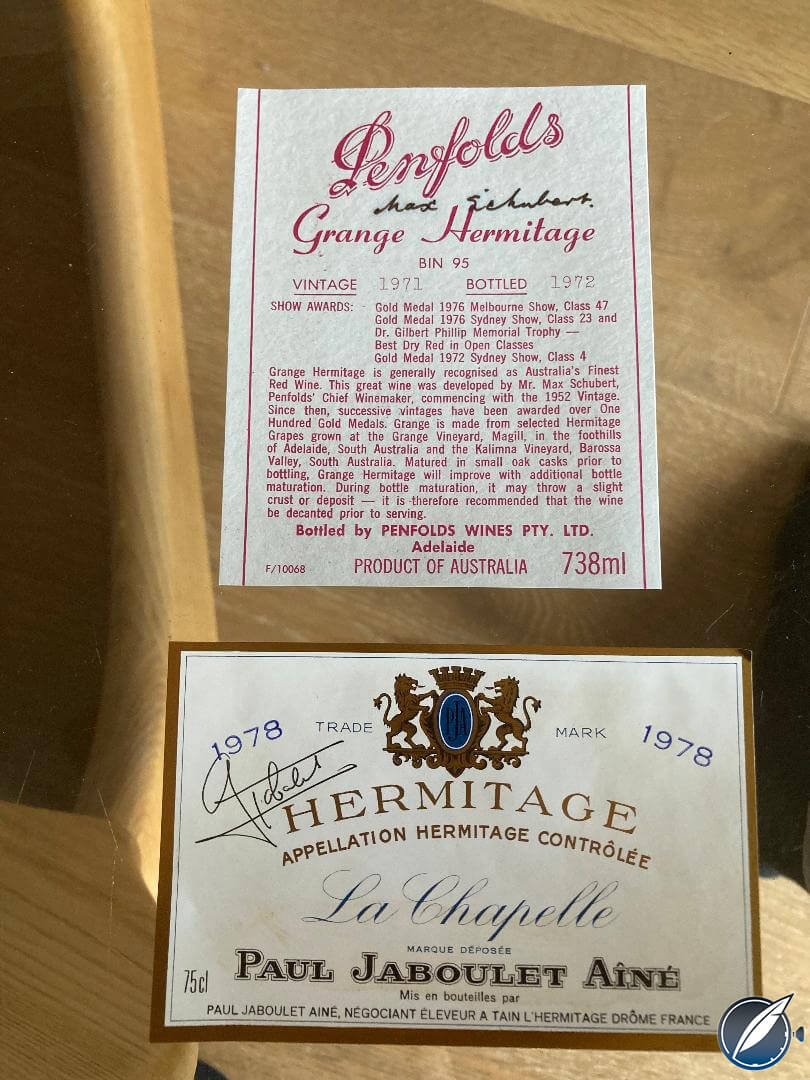
Penfolds Grange La Chapelle 2021 label (photo courtesy Martin Gillam)
The Grange La Chapelle 2021 has been dubbed everything from a wonder child to a vinous Frankenstein (which is a little odd as Frankenstein was the doctor, not the monster).
Wine writers have been attacked for, wait for it, writing about it. It has been called outrageously expensive, pretentious, an abandonment of terroir, a vacuous totem of wealth, not the sort of thing that the First Growths would ever contemplate doing, the wine version of the Emperor’s new clothes and so on.
As this is a family site, my response must, of necessity, be somewhat muted, so shall we leave it at, what utter tosh.
Some of these criticisms come from the public, some from other writers, and some from a wine-focused email group which most kindly includes me (and which I do hope will not immediately blackball me for this). Some also comes from mates with whom I regularly meet for lunch, who have expressed both cynicism and scepticism.
What is interesting for me is that my mates, and I suspect some of the others, have not bought a bottle of Grange since it was about $30 a bottle. There is simply no chance of them ever even considering buying a bottle of this wine, so why such outrage is a little beyond me. What I do find fascinating is that a good few of them would not hesitate to buy La Chapelle and many have a wide representation of it in their cellars.
It seems that the cultural cringe is not completely gone just yet. These guys are not the target market for a wine like this. That, of course, does not stop them offering their views on the concept, and nor should it, but I fail to understand why, simply because they have no interest in buying it, they should be up in arms because others might.
The price? Yes, it is ridiculously beyond comprehension. Way beyond anything I could contemplate and that, I suspect, applies to most of us. But the fact that it has already sold out, as did the Penfolds G3, G4 and G5 and other Special Bins before them did, means that others are interested. Just as they are interested in, and prepared to pay for, top Grand Cru Burgundies and other eye-wateringly expensive wines. Why should they be prevented from doing so?
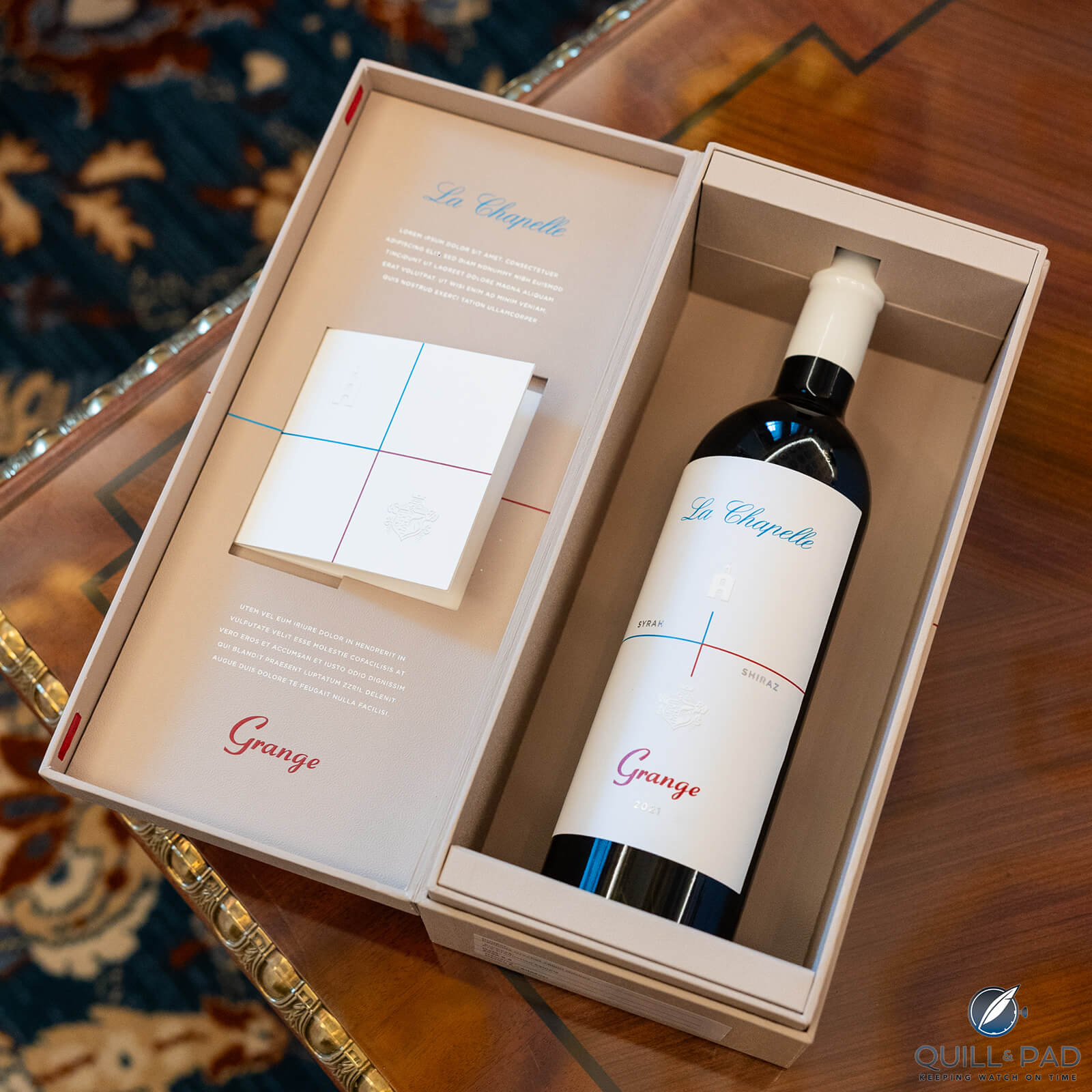
Penfolds Grange La Chapelle 2021 in box
Anyone going to whinge if these wealthy folk put thousands on red at the casino? Yet, if they spend that same amount on a wonderful bottle of red, angels tremble, and demons lament.
Terroir? It is undoubtedly an important component of many great wines from around the globe, but certainly not all. Bordeaux can fudge terroir to a degree by buying and including other vineyards and there would be no Bordeaux terroir at all if the swamps had not been drained – human activity – a few centuries ago.
Champagne has never been a wine of terroir, at least until the arrival of the grower movement and single vineyard releases. There have been some pretty special champagnes over the decades. There are others, of course. Vintage port, anyone?
Does the negation of terroir diminish those wines? Not for me. And most importantly, Grange has never been a wine of terroir, being sourced from vineyards throughout South Australia, including the Barossa, Coonawarra, Clare, McLaren Vale and others. If a wine must exhibit terroir for you, then this is not your cup of tea, so to speak. I would add that if you limit yourself to wines of terroir only, then you are doing yourself a grave disservice.
Not writing about it? Well, and as much as I might wish I could, no one puts a gun to anyone’s head forcing them to read about it. About any wine. If it is not of interest, move on. I accept that some readers simply want shopping lists, wines that they can afford. But many others are interested in wine in general, what is happening in the wine world, new wines, new innovations, stories about regions and winemakers.
For me, it is the equivalent of writing for a mountain climbing magazine. I might be a keen climber (okay, that was many years ago), but I accept that I will never climb Everest or K2 or their ilk. But that does not mean I do not want to read about others doing so. Quite the contrary. If you are a shopping list only reader, fine, this is of no interest. But if wine interests you, this wine should. Of course, that does not mean you have to approve what they have done.
Pretentious? Is it any more pretentious than Grand Cru Burgundies costing $1,000 or many times that? Of prestige Champagnes and First Growth Bordeaux? Surely, if what is in the bottle is good, then that trumps any so-called pretensions.
As for the First Growths never demeaning themselves in this manner, Grange has long been seen as the “First Growth of the Southern Hemisphere”. Hugh Johnson said so many years ago. La Chapelle may have had its ups and downs, and producers like Chave, Rayas, Guigal and Chapoutier may have had their respective moments in the sun, but La Chapelle has been seen as the great wine from the Rhone for decades – at the very least, one of them.
In other words, wines like La Chapelle and Grange sit on a par with the First Growths. I am not convinced that the First Growths would never do something like this, but who cares. These guys have done it and good luck to them.
I have no issue with anyone saying that it is not for them, that they would never spend the money and have no interest. But why should that mean it is not available to others? Kudos to both Jaboulet and Penfolds, especially Frey and Gago, for bringing this audacious project to fruition and we look forward to seeing what the future brings.
And if you ever get the chance to try it, don’t miss it.
For more information, please visit www.penfolds.com/en-fr/wines/limited-editions/grange-lachapelle.html
You might also enjoy:
The Sensational (Grange) G5 Wine, Peter Gago, And The History Of Penfolds
Penfolds Bin 60A 1962: Australia’s Greatest Wine Ever (Or Certainly A Serious Contender)
Henschke Single Vineyard Wine Releases 2021: the Hype for These Wines is (rightfully) Deafening



Leave a Reply
Want to join the discussion?Feel free to contribute!